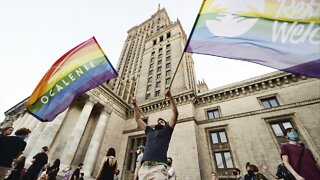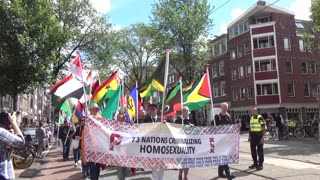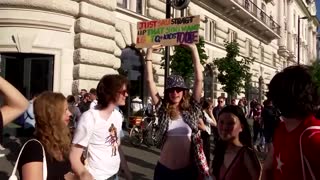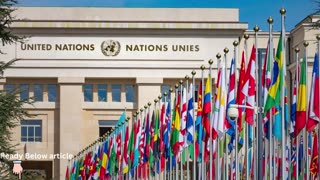Discover the Surprising LGBTQ Rights in Germany! #shorts #travelvlog
Introduction
Berlin, the capital of Germany, has long been known for its tolerant and progressive stance towards people of different sexual orientations and gender identities. Over the years, the city has witnessed significant strides in promoting LGBTQ rights, with a range of policies, campaigns, and initiatives aimed at creating a more inclusive and accepting environment for the LGBTQ community. This report aims to provide a detailed overview of the social and legal strides made for the acceptance and rights of the LGBTQ community in Berlin, Germany.
Historical Overview of LGBTQ Rights in Germany
The history of LGBTQ rights in Germany dates back to the early 20th century when activists like Magnus Hirschfeld worked towards promoting tolerance and acceptance of homosexuality. However, the Nazi regime in the 1930s launched a brutal crackdown on the LGBTQ community, resulting in the persecution, imprisonment, and murder of thousands of individuals. It was not until the 1960s that the gay rights movement began to gain momentum, with the first gay rights organization, Homosexuelle Aktion Westberlin, founded in 1969.
In the following decades, Germany witnessed a series of milestones in the fight for LGBTQ rights. In 2001, Germany became the first country in the world to legally recognize same-sex partnerships, which granted same-sex couples many of the same rights as married heterosexual couples. In 2002, the country passed an anti-discrimination law that made it illegal to discriminate against someone based on their sexual orientation or gender identity.
Social Attitudes towards LGBTQ Individuals
Berlin is considered one of the most LGBTQ-friendly cities in the world, with a vibrant LGBTQ community and a range of initiatives aimed at promoting acceptance and equality. One of the most significant initiatives is the annual Christopher Street Day (CSD) parade, first held in 1979, which celebrates LGBTQ rights and features a colorful procession of floats, music, and dancing.
Numerous advocacy organizations, events, and support groups are working towards promoting the rights and well-being of the LGBTQ community in Berlin. These include LGBTIQ Refugees Berlin, which provides support and assistance to refugees fleeing persecution based on their sexual orientation or gender identity, and Queer Amnesty Berlin, which campaigns for the rights of LGBTQ individuals globally.
A recent survey conducted by the Berlin State Office for Equal Treatment and Against Discrimination found that the majority of Berliners (78%) did not have any issue with LGBTQ people, while only 7% expressed negative attitudes.
Legal and Policy Framework for LGBTQ Rights
Germany's legal and policy framework for LGBTQ rights is among the most progressive in the world, with a range of laws and initiatives aimed at promoting equality and non-discrimination.
Germany's anti-discrimination law prohibits discrimination on the basis of sexual orientation and gender identity in employment, education, housing, and other areas. Transgender individuals are entitled to change their legal gender without undergoing surgery or sterilization, and the government provides financial assistance to transgender individuals seeking gender reassignment surgery.
In terms of healthcare, LGBTQ individuals are entitled to receive the same level of care as heterosexual individuals, and healthcare providers are required to respect an individual's gender identity and sexual orientation. Additionally, the country's education system includes comprehensive sex education that covers a range of topics, including sexual orientation and gender identity.
Challenges and Areas for Improvement
Despite the significant strides made in promoting LGBTQ rights in Berlin, challenges and areas for improvement remain. Transgender individuals still face significant challenges, including social stigma, discrimination, and lack of access to gender-affirming healthcare. There is also a need for more inclusive policies and programs aimed at promoting the well-being of LGBTQ refugees and migrants.
Conclusion
Berlin has come a long way in promoting LGBTQ rights, with a host of social and legal initiatives aimed at promoting tolerance and equality. While challenges remain, the city's progressive stance towards LGBTQ rights provides a beacon of hope and inspiration, serving as a model for other cities and countries seeking to promote a more inclusive and accepting society.
-
 2:48
2:48
Eu Politics
11 months ago🇪🇺 LGBTQI Rights Across Europe: Graffiti, Pride, and Flags in 2021 🇪🇺
-
 10:17
10:17
Vince Dao
1 year agoCrazy Feminists Legalize PUBLIC NUDITY in Germany.
164 -
 1:29
1:29
Reuters
2 years agoHungarians march against anti-LGBTQ law for Pride
4779 -
 1:11
1:11
WTMJMilwaukee
3 years agoCelebrating Pride Month and protecting LGBTQ rights
14 -
 1:26
1:26
Newsy
3 years agoPro-LGBTQ Protests Spark As Homophobia Escalates In Poland
372 -
 28:47
28:47
Amsterdam Netherlands Culture and Arts LGBTQIA+ Pride
5 months agoAmsterdam Nederland's Gay LGBTQIA+Pride 2017 Pride Walk 1 Europe.
7 -
 1:13
1:13
Disturbing News Daily
2 months agoDr. Jill Compares Banning LGBT Books In School To Nazi Germany
32 -
 1:10
1:10
Reuters
2 years agoHungarians protest crackdown on LGBTQ rights
5335 -
 0:05
0:05
DiggTrueInfor17
1 year agoJUST IN-United Nations Attempting to Push LGBTQ Agenda for Religious Communities
1822 -
 7:11
7:11
Brad Polumbo
7 months agoLGBTQ activists CELEBRATE insane act of censorship!
28